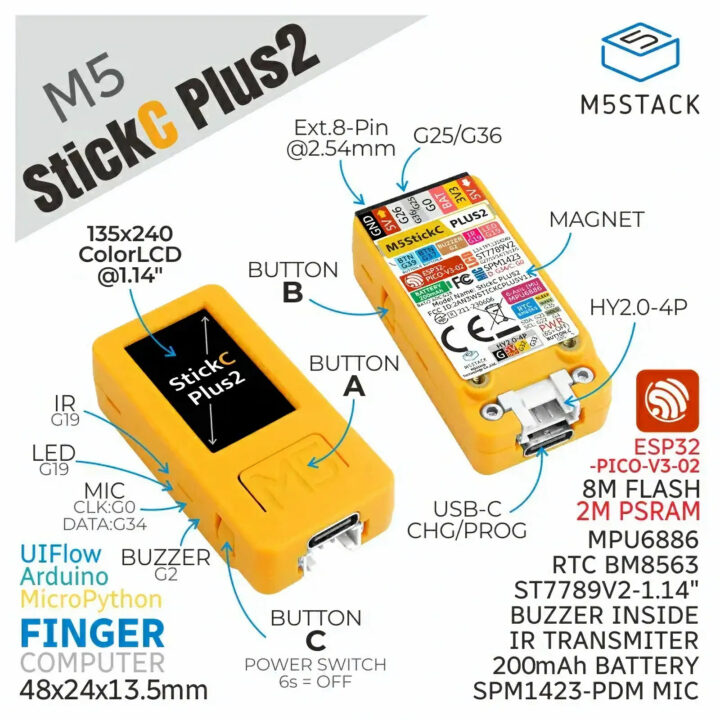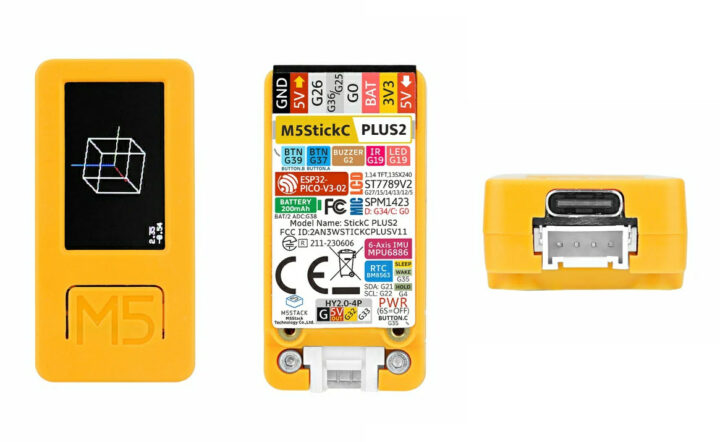M5Stack M5StickC PLUS2 is a battery-powered ESP32 IoT development kit with a 1.14-inch display, a built-in microphone, a 6-axis gyroscope and accelerometer, a few buttons, a buzzer, a Grove connector and a GPIO header for expansion.
It builds upon the M5StickC Plus released in September 2020, but replaced the ESP-PICO-D4 SiP with an ESP32-PICO-V3-02 still based on ESP32 WiSoC but having 8MB SPI flash and 2MB flash and also features a larger 200 mAh battery along with a new CH9102 USB to TTL chip and does without a PMIC.
M5StickC PLUS2 key features and specifications: ESP32-PICO-V3-02
- SiP – Espressif Systems ESP32-PICO-V3-02 system-in-package with ESP32 dual-core WiFI and Bluetooth IoT processor @ up to 240 MHz, 8MB SPI flash, 2MB PSRAM
- Display – 1.14-inch Color TFT LCD with 135×240 resolution (ST7789v2 driver)
- Audio – SPM1423 microphone, buzzer
- USB – 1x USB-C port for power and programming using CH9102 USB to TTL chip (instead of CH552)
- Antenna – 2.4GHz 3D antenna
- Expansion
- 1x Grove connector with I2C, I/O or UART
- 8-pin port with G0, G25/G36, G26, G32, G33
- Sensors – MPU6886 6-axis motion sensor with gyroscope and accelerometer
- Misc – 3x user buttons, green LED, IR blaster, BM8563 RTC,
- Power Supply – 5V @ 500mA via USB Type-C port;
AXP192 PMU - Battery – 200 mAh @ 3.7V LiPo battery
- Dimensions – 48 x 25 x 13.5 mm (Plastic enclosure)
- Weight – 17g
- Temperature Range – 0°C to 60°C
Like other M5Stack boards, the M5StickC PLUS2 can be programmed using the UIFlow visual programming interface or the Arduino IDE. You’ll find instructions to get started with either on the documentation website. We are told the removal of the AXP192 PMIC improves WiFi and infrared signals, but it’s unclear how this affects battery charging.
The M5StickC PLUS2 ESP32 Mini IoT Development Kit can be purchased for $19.95 on M5Stack’s online store, or the same price as the M5Stick PLUS devkit.

Jean-Luc started CNX Software in 2010 as a part-time endeavor, before quitting his job as a software engineering manager, and starting to write daily news, and reviews full time later in 2011.
Support CNX Software! Donate via cryptocurrencies, become a Patron on Patreon, or purchase goods on Amazon or Aliexpress






